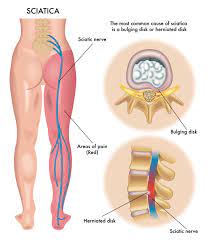
Homeopathic Treatment of Sciatica
Sciatica is a common type of pain affecting the sciatic nerve, a large nerve extending from the lower back down the back of each leg. Sciatica usually affects only one side of the lower body. Often, the pain extends from the lower back all the way through the back of the thigh and down through the leg. Depending on where the sciatic nerve is affected, the pain may also extend to the foot or toes.
Sciatica is the name given to any pain stemming from the irritation of the sciatic nerve. Anything that irritates this nerve can cause pain that ranges from mild to severe; usually, from a compressed nerve root in the lumbar (lower) spine. Often, the term "sciatica" is confused with general back pain. However, sciatica is not just limited to the back.
The sciatic nerve is the longest and widest nerve in the human body. It runs from the lower back, through the buttocks, and down the legs, ending just below the knee. This nerve controls several muscles in the lower legs and allows that area to be sensitive to touch. Sciatica is not, in fact, a condition, but rather a symptom of another problem involving the sciatic nerve.
Sciatica is a set of symptoms including pain that may be caused by general compression or irritation of one of five spinal nerve roots that give rise to each sciatic nerve, or by compression or irritation of the left or right or both sciatic nerves. The pain is felt in the lower back, buttock, or various parts of the leg and foot. In addition to pain, which is sometimes severe, there may be numbness, muscular weakness, pins and needles or tingling and difficulty in moving or controlling the leg. Typically, the symptoms are only felt on one side of the body. Pain can be severe in prolonged exposure to cold weather.
Causes of Sciatica:
Caudaequina syndrome - a rare, but serious condition that affects the nerves on the lower part of the spinal cord; it requires immediate medical attention. Caudaequina syndrome may permanently damage the nervous system and even lead to paralysis.
Symptoms of Sciatica:
Types of sciatica:
1. Acute sciatica (short-term):
Acute sciatica does not typically require professional treatment; symptoms can be significantly reduced with the use of accessible over-the-counter (OTC) painkillers combined with hot and cold packs and exercise.
2. Chronic sciatica (long-term):
Chronic sciatica, on the other hand may require physical therapy, which may include exercise, applied heat, and other techniques. In rare cases surgery may be required.
Acute sciatica may last between four to eight weeks, while chronic sciatica persists for longer.
Treatment of Sciatica:
Medications:
The types of drugs that might be prescribed for sciatica pain include:
Physical therapy:
Once your acute pain improves, your doctor or a physical therapist can design a rehabilitation program to help you prevent recurrent injuries. This typically includes exercises to help correct your posture, strengthen the muscles supporting your back and improve your flexibility.
Steroid injections:
In some cases, doctor may recommend injection of a corticosteroid medication into the area around the involved nerve root. Corticosteroids help reduce pain by suppressing inflammation around the irritated nerve. The effects usually wear off in a few months.
Surgery:
This option is usually reserved for times when the compressed nerve causes significant weakness, bowel or bladder incontinence or when you have pain that progressively worsens or doesn't improve with other therapies. Surgeons can remove the bone spur or the portion of the herniated disk that's pressing on the pinched nerve.
Homeopathic Treatment of Sciatica:
Homeopathy is the only form of safe and gentle treatment which shows positive and permanent response in treating sciatica. Constitutionally prescribed homeopathic remedies can effectively and permanently reduce pain and other Homeopathic medicines treat by strengthening our vital force which is an intelligent energy principle in our body that balances many functions and provides protection from illness. Homeopathic treatment being based on the hypothesis of "like cures like" and a deep emphasis on the principles of holistic medicine (treat the whole person), its remedies work by stimulating the body's own healing power by introducing tiny doses of natural substances that stimulates a person's immune system and defense system to correct itself naturally.
Homoeopathy treat by strengthing the inner being i.e our vital force of our body. Basically it works by stimulating the body’s own healing power to fight the existing disease. Homoeopathy works on natural healing principle. Constitutional medicine in homoeopathy covers the whole personality of patient and works by maintaining balance between physical health and mind.to restore balance and health.
Other self-care treatments that may be helpful include: